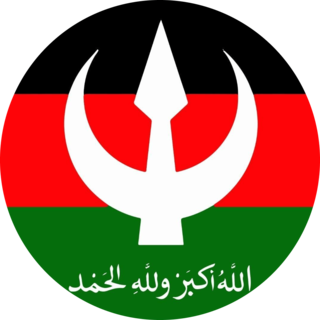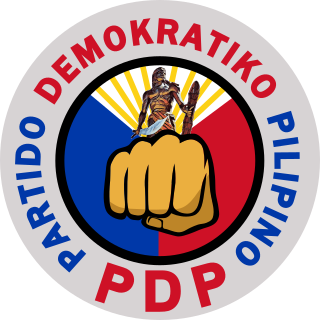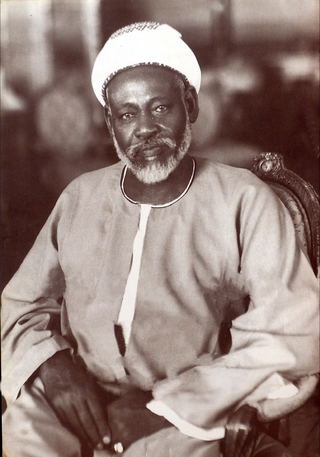Related Research Articles

Ismail al-Azhari was a Sudanese nationalist and political figure. He served as the first Prime Minister of Sudan between 1954 and 1956, and as President of Sudan from 1965 until he was overthrown by Gaafar Nimeiry in 1969.

The National Umma Party is an Islamic political party in Sudan. It was formerly led by Sadiq al-Mahdi, who served twice as Prime Minister of Sudan, and was removed both times by military coups. As of 2019, Major General Fadlallah Baramah Nasser was the acting Chair of the party, and al-Mahdi's daughter, Mariam al-Mahdi, was one of the three vice-chairs.

Sadiq al-Mahdi, also known as Sadiq as-Siddiq, was a Sudanese political and religious figure who was Prime Minister of Sudan from 1966 to 1967 and again from 1986 to 1989. He was head of the National Umma Party and Imam of the Ansar, a Sufi order that pledges allegiance to Muhammad Ahmad (1844–1885), who claimed to be the Mahdi, the messianic saviour of Islam.

Islam is the most common religion in Sudan and Muslims have dominated national government institutions since independence in 1956. According to UNDP Sudan, the Muslim population is 97%, including numerous Arab and non-Arab groups. The remaining 3% ascribe to either Christianity or traditional animist religions. Muslims predominate in all but Nuba Mountains region. The vast majority of Muslims in Sudan adhere to Sunni Islam of Maliki school of jurisprudence, deeply influenced with Sufism. There are also some Shia communities in Khartoum, the capital. The most significant divisions occur along the lines of the Sufi brotherhoods. Two popular brotherhoods, the Ansar and the Khatmia, are associated with the opposition Umma and Democratic Unionist Parties respectively. Only the Darfur region is traditionally lacking the presence of Sufi brotherhoods found in the rest of the country.

Partido Demokratiko Pilipino–Lakas ng Bayan, abbreviated as PDP–Laban, is a democratic socialist political party in the Philippines founded in 1982. It was part of the country's ruling party coalition from 1986 to 1992 under the administration of Corazon Aquino and the country's ruling party from 2016 to 2022 under the administration of Rodrigo Duterte.

The Democratic Unionist Party, also referred to by itself as the Original Democratic Unionist Party, is a political party in Sudan, closely tied to the Khatmiyya Sufi order.

The Republic of Sudan was established as an independent sovereign state on 1 January 1956 upon the termination of the condominium of Anglo-Egyptian Sudan, over which sovereignty had been vested jointly in Egypt and the United Kingdom. Before 1955, however, whilst still subject to the condominium, the autonomous Sudanese government under Ismail al-Azhari had temporarily halted Sudan's progress toward self-determination, hoping to promote unity with Egypt. Despite his pro-Egyptian National Unionist Party (NUP) winning a majority in the 1953 parliamentary elections, Azhari realized that popular opinion had shifted against such a union. Azhari, who had been the major spokesman for the "unity of the Nile Valley", therefore reversed the NUP's stand and supported Sudanese independence. On December 19, 1955, the Sudanese parliament, under Azhari's leadership, unanimously adopted a declaration of independence that became effective on January 1, 1956. Azhari called for the withdrawal of foreign troops and requested the governments of Egypt and the United Kingdom to sponsor a plebiscite in advance.

Egypt–Sudan relations are the bilateral relations between the governments of Egypt and Sudan. Contact between Egypt and Sudan goes back to trade and conflict during ancient times. In 1820, Egypt conquered Sudan, and continued to occupy the country, later as a condominium under the British, until Sudan declared Independence in 1956. Sudan later joined the Arab League, which Egypt is a founding member. Relations between successive governments in Egypt and Sudan have warmed and cooled relations at various times. Relations today are cordial, but tensions remain.

Parliamentary elections were held in Sudan between 12 April and 2 May 1968. The election followed the resignation of a third of the members of the Assembly elected in 1965. The result was a victory for the new Democratic Unionist Party, formed by a merger of the National Unionist Party and the People's Democratic Party in December 1967 and led by President Ismail al-Azhari, which won 101 of the 218 seats. Voter turnout was 61.0%.
William Deng Nhial was the political leader of the Sudan African National Union, SANU, from 1962 to 1968. He was elected unopposed. He was one of founders of the Anya Nya Military Wing of the Liberation of Southern Sudan, fighting for the independence of Southern Sudan. He was ambushed and killed by Sudan's army on 9 May 1968 at Cueibet, on his way from Rumbek to Tonj. The Sudan government denied having authorised the assassination. Although no investigation was conducted, eyewitnesses at Cueibet village and SANU investigation committee confirmed the assassins to be the Sudan army.
The Liberal Party, at first called the Southern Party and later the Southern Liberal Party, was formed in the Anglo-Egyptian Sudan before the Sudan became independent in January 1956. Until the military coup of November 1958 the Liberals were one of the main parties representing the Southern Sudan constituencies in parliament.

Sayyid Abd al-Rahman al-Mahdi, KBE was one of the leading religious and political figures during the colonial era in Anglo-Egyptian Sudan (1898–1955), and continued to exert great authority as leader of the Neo-Mahdists after Sudan became independent. The British tried to exploit his influence over the Sudanese people while at the same time profoundly distrusting his motives. Throughout most of the colonial era of Anglo-Egyptian Sudan, the British saw Sayyid Abd al-Rahman al-Mahdi as important as a moderate leader of the Mahdists.

The Ansar is a Sufi religious movement in the Sudan whose followers are disciples of Muhammad Ahmad, a Sudanese religious leader based on Aba Island who proclaimed himself Mahdi on 29 June 1881. His followers won a series of victories against the Egyptians culminating in the capture of Khartoum in January 1885.
The Anti-Imperialist Front was a political movement in Sudan, founded in 1952. The Anti-Imperialist Front was organized by the clandestine Sudanese Movement for National Liberation. The communists decided not to try to register their own party ahead of the 1953 legislative election, preferring to launch the Anti-Imperialist Front as their legal umbrella organization.
The Socialist Republican Party was a political party in Sudan, founded in 1951. Ibrahim Bedri was the general secretary of the party. The party was floated ahead of the 1953 Sudanese legislative election. The party mobilized a section of tribal chiefs and sheikhs. However, the development of the Socialist Republican Party never took off, and the party lacked financial resources, organizational structures and a coherent programme.

The 1969 Sudanese coup d'état was a successful coup, led by Colonel Gaafar Nimeiry, against the government of President Ismail al-Azhari. The coup signaled the end of Sudan's second democratic era, and saw the beginning of Nimeiry's 16 year rule.
The Islamist movement in Sudan started in universities and high schools as early as the 1940s under the influence of the Egyptian Muslim Brotherhood. The Islamic Liberation Movement, a precursor of the Sudanese Muslim Brotherhood, began in 1949. Hassan Al-Turabi then took control of it under the name of the Sudanese Muslim Brotherhood. In 1964, he became secretary-general of the Islamic Charter Front (ICF), an activist movement that served as the political arm of the Muslim Brotherhood. Other Islamist groups in Sudan included the Front of the Islamic Pact and the Party of the Islamic Bloc.
The 1958 Sudanese coup d'état was a bloodless military coup which took place in Sudan on 17 November 1958.

The First Sudanese Sovereignty Council, (or Supreme Commission or Commission of Sovereignty, was established in the context of Sudan's struggle for independence and the subsequent transition to self-rule. Sudan, formerly under joint British-Egyptian rule, gained independence on 1 January 1956. The council was formed on 26 December 1955 to oversee the governance of the Republic of Sudan during this transitional period. The members of the council included Abd al-Fattah Muhammad al-Maghribi, al-Dardiri Muhammad Uthman, Ahmad Muhammad Yasin, Ahmad Muhammad Salih, and Siricio Iro Wani. The prime minister was Ismail al-Azhari until 5 July 1956 followed by Abdallah Khalil until the 17 November 1958 Sudanese coup d'état.

Abdallah al-Fadil al-Mahdi was a Sudanese statesman and key figure in Sudan's path to independence by playing an important role in the "Gentlemen's Agreement" with Egypt in 1952, enabling Sudan's self-government and self-determination. Abdallah was a National Umma Party member. He resisted Ibrahim Abboud's rule, and after October 1964 revolution, he served on the Sudanese Sovereignty Council and was instrumental in establishing a mosque in the Republican Palace. Abdallah married twice and emphasised education for his children.
References
- ↑ Warburg, Gabriel. Historical Discord in the Nile Valley. p. 141.
- 1 2 MacEoin, Denis; Al-Shahi, Ahmed. Islam in the Modern World (RLE Politics of Islam).